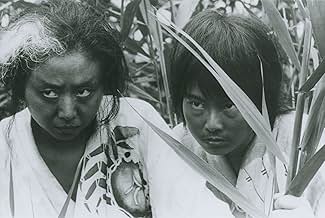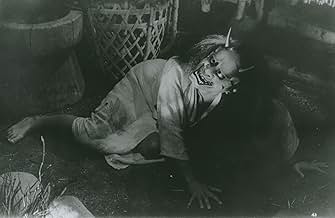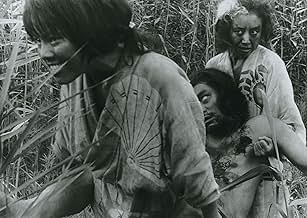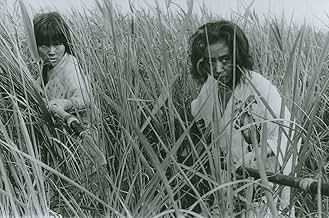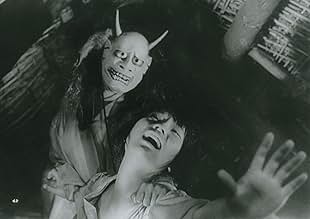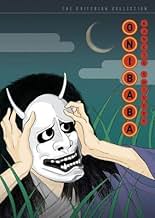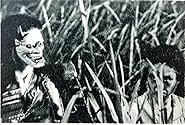AVALIAÇÃO DA IMDb
7,8/10
24 mil
SUA AVALIAÇÃO
Duas mulheres matam samurais e vendem seus pertences para ganhar a vida. Enquanto uma delas tem um caso com seu vizinho, a outra mulher encontra um misterioso samurai usando uma máscara estr... Ler tudoDuas mulheres matam samurais e vendem seus pertences para ganhar a vida. Enquanto uma delas tem um caso com seu vizinho, a outra mulher encontra um misterioso samurai usando uma máscara estranha.Duas mulheres matam samurais e vendem seus pertences para ganhar a vida. Enquanto uma delas tem um caso com seu vizinho, a outra mulher encontra um misterioso samurai usando uma máscara estranha.
- Prêmios
- 2 vitórias no total
Avaliações em destaque
To describe this film in one word, that word would have to 'wow', or something to that effect. In short, Onibaba is an absolutely spectacular cinematic spectacle, and one that has few equals in it's field. In fact, it's the perfect fusion between art-house cinema and atmospheric horror! Loosely based on a Buddhist fable, Onibaba tells a story of lust, envy, wrath and betrayal which is wrapped up by way of a hideous demon mask. Onibaba is a human drama before it's a horror movie - all the character actions are driven by their various needs and wants, and the all the comeuppance emancipates from there. The characters and their actions are constantly fascinating, and it's that which predominantly keeps the film alive. We follow a mother and her daughter-in-law; a couple that are forced to eke out an existence in war torn Japan by killing passing samurai's and selling their belongings for food. Their existence is upset one day, however, when the son's friend, Hachi, returns from the war to the place where the two women live.
The title of the film roughly translates into English as 'demon woman', and that is an apt title for this story. Although the film doesn't contain any actual demons or other mythical creatures, the real horror comes from the character actions and the film succeeds as a horror film in that way. The atmospheric location, which consists of a huge area covered in reeds, adds weight to film's claim to the horror genre also and the location provides a truly stunning set for this story to take place. The film also features a dark pit, which the women use to dump the bodies of the Samurai they kill, which adds to the fantasy and inventive element of the story. The film is cinematic poetry on many levels, from the bleak yet beautiful cinematography, to the elements of the location mentioned - all the way down to it's central piece of imagery - the mask itself. The mask is the film's centrepiece, and the part's where it features are the most memorable of the movie.
Prolific Japanese director Kaneto Shindô takes us on a tour-de-force of atmospheric direction. He spends a fair amount of time focusing on the reeds blowing in the wind and many of his angles focus on the sky, which will no doubt irritate the less adept viewers amongst us - but the rest of us know that this is a way for Shindô to aptly portray his setting, and every instance when he did that was a delight for yours truly. There are many great shots in this movie, and if you're a fan of technical prowess, Onibaba is your film; and even if you're not, this film is a must see.
The title of the film roughly translates into English as 'demon woman', and that is an apt title for this story. Although the film doesn't contain any actual demons or other mythical creatures, the real horror comes from the character actions and the film succeeds as a horror film in that way. The atmospheric location, which consists of a huge area covered in reeds, adds weight to film's claim to the horror genre also and the location provides a truly stunning set for this story to take place. The film also features a dark pit, which the women use to dump the bodies of the Samurai they kill, which adds to the fantasy and inventive element of the story. The film is cinematic poetry on many levels, from the bleak yet beautiful cinematography, to the elements of the location mentioned - all the way down to it's central piece of imagery - the mask itself. The mask is the film's centrepiece, and the part's where it features are the most memorable of the movie.
Prolific Japanese director Kaneto Shindô takes us on a tour-de-force of atmospheric direction. He spends a fair amount of time focusing on the reeds blowing in the wind and many of his angles focus on the sky, which will no doubt irritate the less adept viewers amongst us - but the rest of us know that this is a way for Shindô to aptly portray his setting, and every instance when he did that was a delight for yours truly. There are many great shots in this movie, and if you're a fan of technical prowess, Onibaba is your film; and even if you're not, this film is a must see.
In the 1400s raging wars between two emperors is being fought. This is not about the wars, but about the poor people struck by it. In a rural location camouflaged by a huge field of tall reeds are two huts. In one of them a young woman lives with her stepmother, her husband went to war. Having had failed crops three times that year they are stricken by poverty. The only way for them to survive is to steal, and the only things to steal are uniforms and swords from dead soldiers or heavily wounded soldiers and then sell them to the underworld. Which by the way is funny, I never thought of the underworld in rural medieval setting before.
This story is just as grim as the demon on the cover. The wind howling in the reeds make for very creepy atmosphere. The music consisting of drums and brassy wind instruments really intensifies the drama.
Just as in sand in Teshigaharas equally excellent 'Suna no Onna' serves as symbol, metaphor and is very important in creating atmosphere we have in 'Onibaba' the tall reeds.
The theme in this, the basic needs and emotions of people, will never be dated. The psychology is thick and real. They are victims of their leaders actions. With all the wars being fought today this is still happening today, please remember that.
This story is just as grim as the demon on the cover. The wind howling in the reeds make for very creepy atmosphere. The music consisting of drums and brassy wind instruments really intensifies the drama.
Just as in sand in Teshigaharas equally excellent 'Suna no Onna' serves as symbol, metaphor and is very important in creating atmosphere we have in 'Onibaba' the tall reeds.
The theme in this, the basic needs and emotions of people, will never be dated. The psychology is thick and real. They are victims of their leaders actions. With all the wars being fought today this is still happening today, please remember that.
Wow,I saw this movie on Cable recently.Both of the women in this story are just trying their best to get by and survive in a bad situation.I could tell it was on a limited budget but very well written.It was erotic with frontal nudity and even filmed in the 60's.It had me on the edge of my seat the whole time.I was trying to figure out where they were going with the whole thing.I kept trying to decide if I sympathized with the old woman more than the young one.Then at the end I felt sorry for both of them.What a great story.This one needs to be on Cable more often.This one is a must see even for people who only like contemporary films.I would recommend it to anyone.
"Battle not with monsters, lest ye become a monster, and if you gaze into the abyss, the abyss gazes also into you."
The characters in Onibaba dwell in the bottom rung of Maslow's Pyramid.
Food, sex, shelter, survival - though not necessarily in that order.
Sexuality permeates every frame of this film. It is ever-present along with the oppressive heat and the marshland weeds.
The stark black and white cinematography perfectly captures the desolate mood.
The score – atonal free jazz backed by tribal rhythms - though completely anachronistic works surprisingly well.
One of the most fiercely primal depictions of the human condition on celluloid, Onibaba is a hauntingly erotic masterpiece.
- Nietzsche
The characters in Onibaba dwell in the bottom rung of Maslow's Pyramid.
Food, sex, shelter, survival - though not necessarily in that order.
Sexuality permeates every frame of this film. It is ever-present along with the oppressive heat and the marshland weeds.
The stark black and white cinematography perfectly captures the desolate mood.
The score – atonal free jazz backed by tribal rhythms - though completely anachronistic works surprisingly well.
One of the most fiercely primal depictions of the human condition on celluloid, Onibaba is a hauntingly erotic masterpiece.
Life's been tough, and you're surviving on the edge, trapping Samurai from flows in which you dredge, your often empty skillet, is sometimes, filled with millet, but at least your daughter in law helps you fetch. A neighbour returns home, with some bad news, your son, fallen in battle, no longer moves, it's not long before his wife, is causing stress, struggle and strife, behaving in a way you wholly disapprove. By fortune, you obtain a Hannya Mask, it comes in handy for a demonising task, a barrier of sorts, daughter in law's trips cut short, but there's no time to enjoy pleasures, or to bask.
Nobuko Otowa provides us with a truly outstanding performance as she grapples with her daughter in law's infidelity after the loss of her husband, leaving her isolated, alone and forgotten. The cinematography is sublime, the raw emotions unrefined, and the mask a cursed damnation that sticks and binds.
Nobuko Otowa provides us with a truly outstanding performance as she grapples with her daughter in law's infidelity after the loss of her husband, leaving her isolated, alone and forgotten. The cinematography is sublime, the raw emotions unrefined, and the mask a cursed damnation that sticks and binds.
Você sabia?
- CuriosidadesOnibaba's literal meaning is demon hag or old devil woman.
- Erros de gravaçãoWhen the two soldiers get off their horses and start fighting in the river, the audio of the water splashing goes on and off. In addition, when the swords clash, there is no sound of clanging heard.
- Versões alternativasOriginally cut in England when released in 1968, though the video releases are uncut.
Principais escolhas
Faça login para avaliar e ver a lista de recomendações personalizadas
- How long is Onibaba?Fornecido pela Alexa
Detalhes
Bilheteria
- Faturamento bruto mundial
- US$ 689
- Tempo de duração
- 1 h 43 min(103 min)
- Cor
- Mixagem de som
- Proporção
- 2.35 : 1
Contribua para esta página
Sugerir uma alteração ou adicionar conteúdo ausente


